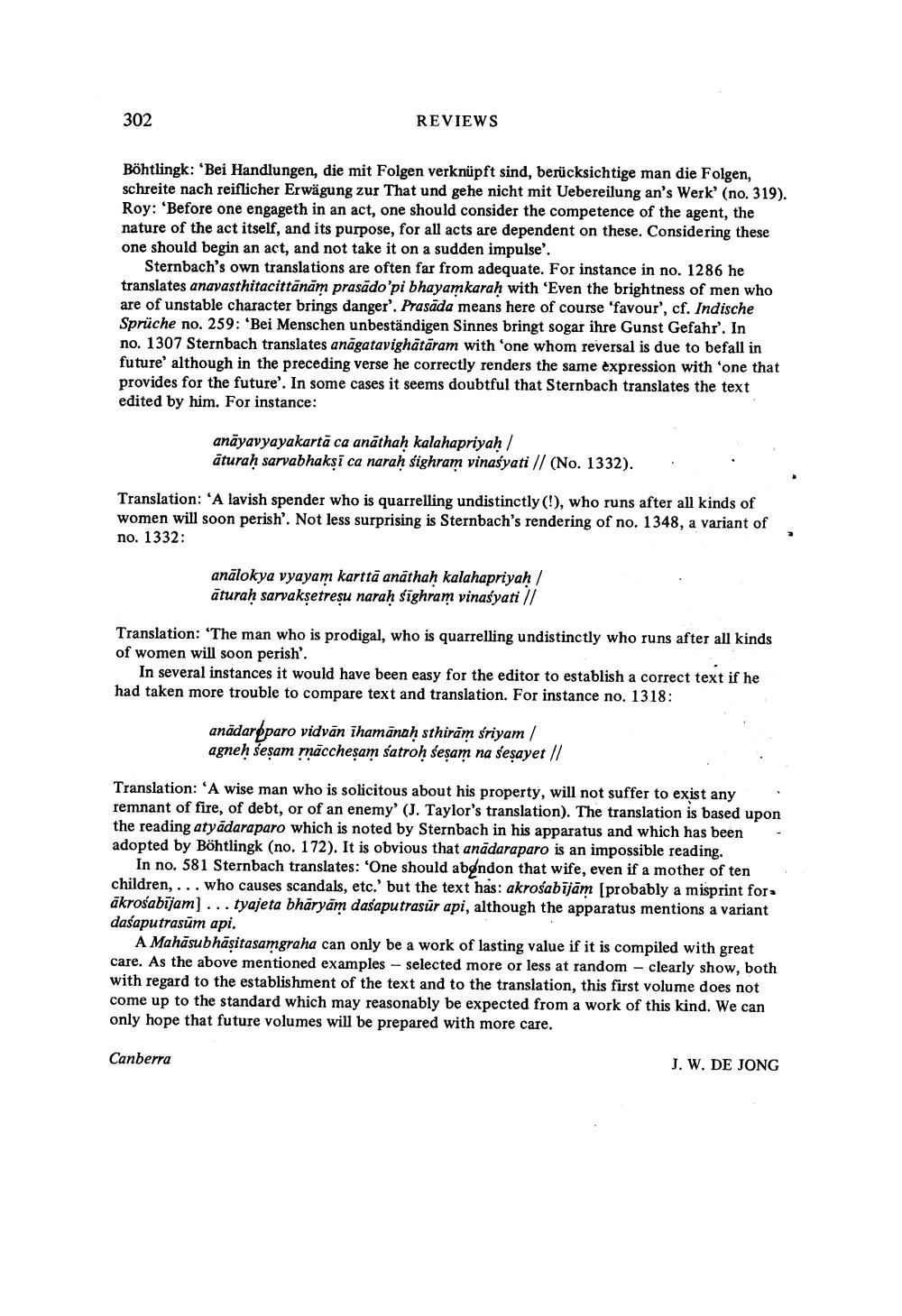Book Title: Reviews Of Different Books Author(s): J W De Jong Publisher: J W De Jong View full book textPage 6
________________ 302 REVIEWS Böhtlingk: 'Bei Handlungen, die mit Folgen verknüpft sind, berücksichtige man die Folgen, schreite nach reiflicher Erwägung zur That und gehe nicht mit Uebereilung an's Werk' (no. 319). Roy: 'Before one engageth in an act, one should consider the competence of the agent, the nature of the act itself, and its purpose, for all acts are dependent on these. Considering these one should begin an act, and not take it on a sudden impulse'. Sternbach's own translations are often far from adequate. For instance in no. 1286 he translates anavasthitacittānām prasado'pi bhayamkaraḥ with 'Even the brightness of men who are of unstable character brings danger'. Prasada means here of course 'favour', cf. Indische Sprüche no. 259: 'Bei Menschen unbeständigen Sinnes bringt sogar ihre Gunst Gefahr'. In no. 1307 Sternbach translates anāgatavighätäram with 'one whom reversal is due to befall in future' although in the preceding verse he correctly renders the same expression with 'one that provides for the future'. In some cases it seems doubtful that Sternbach translates the text edited by him. For instance: anayavyayakarta ca anathaḥ kalahapriyaḥ/ āturaḥ sarvabhakși ca naraḥ sighram vinasyati // (No. 1332). Translation: 'A lavish spender who is quarrelling undistinctly (!), who runs after all kinds of women will soon perish'. Not less surprising is Sternbach's rendering of no. 1348, a variant of no. 1332: analokya vyayam kartta anathah kalahapriyah / aturaḥ sarvakṣetresu narah sighram vinasyati // Translation: "The man who is prodigal, who is quarrelling undistinctly who runs after all kinds of women will soon perish'. In several instances it would have been easy for the editor to establish a correct text if he had taken more trouble to compare text and translation. For instance no. 1318: Canberra anadar paro vidvän ihamanaḥ sthiram śriyam/ agneḥ seṣam rnaccheṣam satroḥ śesam na seṣayet // Translation: 'A wise man who is solicitous about his property, will not suffer to exist any remnant of fire, of debt, or of an enemy' (J. Taylor's translation). The translation is based upon the reading atyādaraparo which is noted by Sternbach in his apparatus and which has been adopted by Böhtlingk (no. 172). It is obvious that anādaraparo is an impossible reading. In no. 581 Sternbach translates: 'One should abandon that wife, even if a mother of ten children,... who causes scandals, etc.' but the text has: akrośabījām [probably a misprint for. akrośabījam]... tyajeta bharyam dasaputrasur api, although the apparatus mentions a variant dasaputrasum api. A Mahāsubhāṣitasamgraha can only be a work of lasting value if it is compiled with great care. As the above mentioned examples selected more or less at random clearly show, both with regard to the establishment of the text and to the translation, this first volume does not come up to the standard which may reasonably be expected from a work of this kind. We can only hope that future volumes will be prepared with more care. J. W. DE JONGPage Navigation
1 ... 4 5 6 7 8 9 10 11 12 13 14 15 16 17 18 19 20 21 22 23 24 25 26 27 28 29 30 31 32
